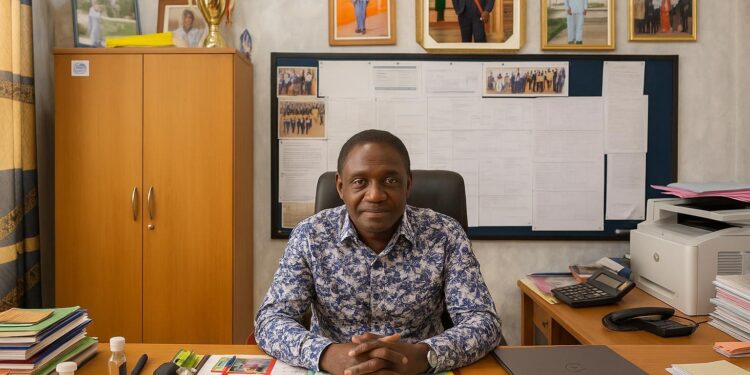Niari Exam Triumph Captures National Attention
The unexpected buzz in Dolisie’s administrative quarter on 18 August came as Serge Roland Kallath disclosed the 2024-2025 examination results. Primary pupils achieved a 78 percent pass rate, junior-secondary candidates 65 percent, and baccalaureate students 54 percent, each indicator comfortably above last year’s national averages.
While provincial in scope, the announcement was swiftly relayed by state television and private radio stations, framing Niari’s performance as evidence of steady progress within the Congolese education system, a sector President Denis Sassou Nguesso frequently describes as foundational to economic diversification.
Decoding the Upward Trend in Success Rates
Education specialists attribute the upward curve to a triad of factors: expanded teacher-training workshops, refurbishment of examination centres, and stricter monitoring mechanisms that limit irregularities and late marking.
Niari’s school inspectors say the decentralised budget allocations approved in Brazzaville last October accelerated textbook procurement, ensuring each classroom holds at least one mathematics and one French manual per three pupils, aligning with UNESCO’s recommended resource ratio.
Adult-literacy campaigns, led jointly by the ministry and local NGOs, enroll nearly 8,000 learners in Niari, indirectly boosting school performance because parents who master basic numeracy are better able to monitor homework, according to provincial literacy coordinator Léon Ndinga.
Government Policy and International Support
Beyond provincial dynamics, the Ministry of Preschool, Primary, Secondary Education and Literacy is midway through its 2015-2025 sector strategy, which prioritises universal primary completion and a gradual move toward competency-based curricula in lower secondary levels.
Financing remains mixed yet resilient. The World Bank’s Quality Education for All project, worth 100 million dollars, supports school-feeding in rural districts, while the African Development Bank’s digital initiative furnishes solar-powered tablets to examination centres, reducing dependency on paper logistics.
Officials in Brazzaville emphasise that donor funding complements, rather than replaces, the 19 percent of national expenditure already earmarked for education, a proportion comparable to Ghana and Kenya, according to the 2023 UNESCO Institute for Statistics database.
Teacher colleges in Nkayi and Owando reopened last year after extensive renovation financed through a Turkish development credit line. The sites now feature science laboratories and language centres, allowing pre-service teachers to experience the very pedagogies they will later deploy in multi-grade rural settings.
Local Realities and Community Engagement
Inside Lycée Technique de Dolisie, headmistress Pauline Ngoma recalls that only half her final-year students secured passing grades a decade ago. ‘Today we speak of majority success,’ she notes, crediting weekend revision camps led by volunteer alumni engineers.
Parents’ associations, once loosely organised, now collect modest monthly dues that finance mock examinations and transport for rural candidates who otherwise walk several kilometres to reach testing centres.
Still, classrooms strain under demographic pressure. Niari’s population grew by 2.8 percent last year, and some schools operate morning and afternoon shifts to accommodate enrolment peaks, a compromise teachers say maintains contact hours but complicates extracurricular mentoring.
Progress is particularly pronounced among girls: Niari’s female baccalaureate pass rate climbed from 42 percent in 2024 to 51 percent this year, a gain school counsellor Mireille Ibata attributes to mentorship programmes championed by the First Lady’s foundation.
Earlier this year, candidates in Dolisie piloted an online registration portal that cut paperwork by half and enabled parents to track seating assignments via SMS, a modest but symbolic stride toward the fully digital examination environment authorities envisage.
Regional Benchmarks and Integration Agendas
Regionally, Congo-Brazzaville’s 2025 BEPC pass rate outpaces Cameroon’s 59 percent and matches Gabon’s 65 percent, data compiled by the Economic Community of Central African States show, reinforcing Brazzaville’s argument that investment is yielding measurable dividends.
Education analysts caution, however, that comparisons must account for differing grading thresholds and urban-rural imbalances, issues the African Union’s Continental Education Strategy urges governments to standardise by 2030.
ECCAS Secretary-General Gilberto Da Piedade Verissimo recently argued that harmonising certification across the bloc would ‘create a common labour market attractive to investors,’ positioning Congo’s current momentum as a template for peer nations.
Diplomatic and Investment Perspectives
Diplomats stationed in Brazzaville increasingly cite education metrics when briefing investors, arguing that a literate workforce anchors stability and broadens the consumer base for sectors ranging from agribusiness to telecommunications.
The European Union’s chargé d’affaires told this magazine that Niari’s figures ‘send an encouraging signal for vocational partnerships,’ echoing private firms that plan apprenticeship schemes aligned with the government’s forthcoming industrialisation road map.
Charting the Next Academic Horizon
Looking ahead, Serge Roland Kallath pledges to deepen collaboration with local universities so trainee teachers can undertake practicums in underserved communities, bridging theory and classroom realities.
His department will also pilot computer-based testing for select subjects in 2026, a move officials hope will reinforce transparency, accelerate marking, and align the Republic of Congo with emerging continental standards in assessment.
For now, optimism remains measured; officials are acutely aware that sustaining gains will depend on predictable funding flows and continued peace — two variables Congo’s partners, both bilateral and multilateral, are eager to safeguard through technical cooperation and dialogue.












































